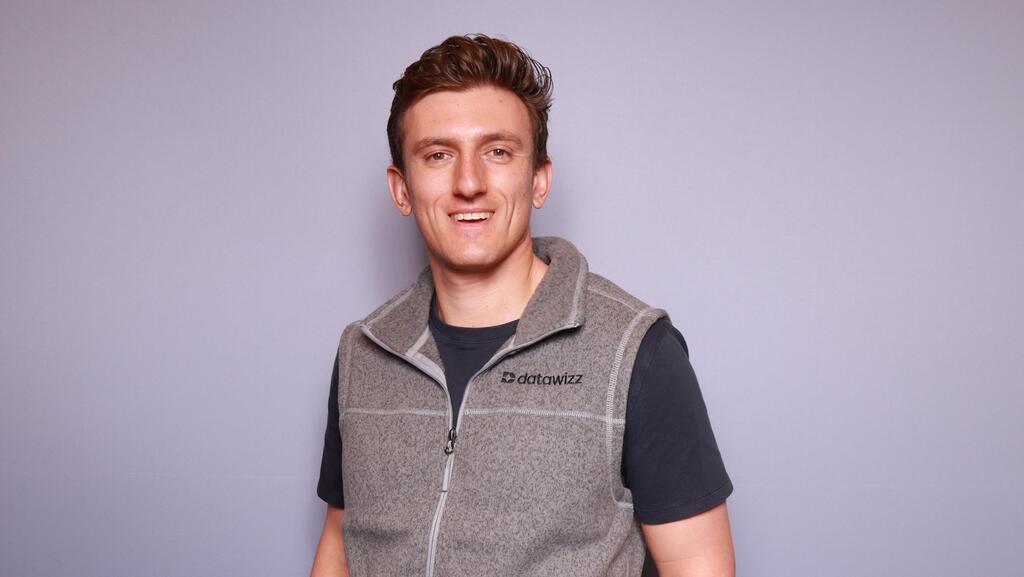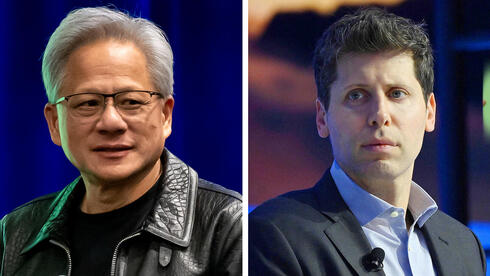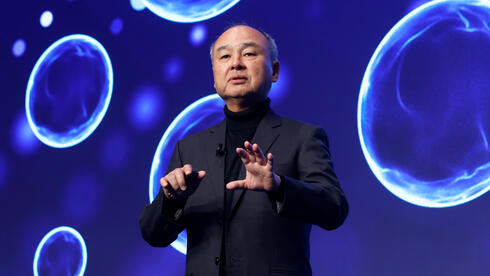
"I hope the AI bubble bursts soon. I need it to happen for my startup to succeed"
After being ousted from RapidAPI, former teen unicorn founder Iddo Gino returns with Datawizz, aiming to cut AI costs, challenge industry giants, and navigate the fevered Silicon Valley landscape.
Iddo Gino is back. With a story and appearance reminiscent of WeWork's Adam Neumann, he has licked the wounds of the painful rejection from the unicorn RapidAPI that he founded at the age of just 17. Today, at 27, still younger than most entrepreneurs, he is already racing ahead with a new startup. This time, the baby is, of course, about artificial intelligence.
Gino founded Datawizz less than a year ago, in January 2025, and is now launching it with a large Seed round of $12.5 million. The round was led by the American venture capital fund Human Capital, which invests in some of the biggest names in Silicon Valley, from Snowflake to Anduril, alongside investors who also supported Gino at Rapid, though not all of them. Two particularly big names are absent this time: Andreessen Horowitz and Masayoshi Son's SoftBank. And that's no coincidence. Throughout this exclusive first interview since he was ousted in 2023 from his position as CEO of his unicorn, Gino remains careful with his words, though he is more implicit about the fact that the giants who inflated the 2021 high-tech bubble contributed both to his rise and to his downfall.
What's the biggest thing you took away from what happened at RapidAPI?
"A lot of things happened because of my lack of self-confidence, which was also related to my age. There were older, more experienced people on the board, and I completely suffered from imposter syndrome. One of the mistakes, among many, that we made, and for which I take responsibility, was that we always wanted to recruit people with experience, to have a lot of responsible adults. But this actually put us in outdated frameworks. It didn’t suit Rapid as a company; these people tried to use the templates they knew from their previous companies, which did more harm than good. Back then, I didn’t have the confidence to speak out. This time, I may still not know how to properly build an AI startup, but unlike in the past, I understand that even someone who built a company 20 years ago doesn’t necessarily know how to do it better than me. Today I have more confidence, more examples from my own experience, and more certainty that just because everyone else is doing something, it doesn’t mean we should do the same."
In his remarks, Gino mainly refers to representatives of the large funds who sat on his board and who, at the height of the bubble, urged him to expand at all costs, and then, when the wind changed direction, pushed him to cut back just as quickly and drastically. Gino, even though he was only 25, and perhaps precisely because of his youth, did not agree. Immediately after his dismissal and replacement by a CEO brought in by the funds, Rapid laid off almost half its employees, and shortly thereafter was left with only a quarter of its workforce.
Related articles:
Ultimately, what remained of one of the most intriguing and fastest-growing unicorns to come out of Israel, which had raised nearly $300 million, was sold a year ago for pennies to Nokia. Nokia mainly acquired the intellectual property of the company, which had tried to develop shortcuts in software development so that developers could pull ready-made components from its platform without building everything from scratch, a bit like today’s AI agents. Gino says that if he had had another six months at Rapid, he would already know how to introduce it to this new world.
"There's a lot of noise out there. The most important thing is to ignore 80% of it"
Despite what one might think in light of the powerful experience of his "rise and fall," Gino emerged from the experience neither traumatized nor afraid of entrepreneurship. Rather, he is excited for the battle of innovation in San Francisco, which is ablaze with AI fever.
You say you learned from past mistakes and will do everything differently this time, but here you are again doing it completely alone without a co-founder, and again raising a large sum for a seed round.
"I haven’t yet found the person who can tolerate me as a co-founder for long periods," laughs Gino, but quickly grows serious: "We didn’t plan to raise so much and so quickly. I wanted to build a much smaller and more efficient company this time. I started without a presentation and without meetings with funds, only with angels who had invested in me in the past, and I was thinking about something like $2 million. But then Human Capital, whom I knew from the Rapid era, heard about the new company and came with an offer of $10 million. In the investment agreement (term sheet) we received, there was no pre-set valuation; I could put whatever I wanted, and I chose a much more reasonable number, far lower than they expected. At Rapid, I learned that there is a lot of noise out there, for better or worse, the most important thing is to ignore 80% of it."
And what do you think of a one-person unicorn, the updated dream of Silicon Valley in the age of artificial intelligence?
"Maybe not one person, but yes, you can do things today with a lot less. It’s not just AI, but also managing more effectively. Even without AI, in retrospect, I could have built Rapid with half the people, or even fewer."
And aren’t there concerns that with large sums of money will come a renewed attempt to pin a 'responsible adult' label on you?
"I’ve grown up and can be the responsible adult myself," says Gino, who has cut the long hair that reminded everyone of Adam Neumann. At least in his body language, as much as can be sensed over a Zoom call from San Francisco, where he has lived in recent years, he has indeed grown up and become less frenetic.
And yet, Gino is still that child prodigy who knows everything and maybe even a little cheeky, unafraid to go against the whole world, with complete confidence, whether this time it is real or forced, like in the previous round. When he founded Rapid at the age of 17, his father even signed legal documents for him because Gino was a minor, and in meetings and events with big-name investors, from Ben Horowitz to Peter Thiel, one of the founders of PayPal, he was forced to drink Coke, not alcohol.
Let’s start with the name of the new company - Datawizz. Do you dream of being like Wiz, the great Israeli success sold to Google for $32 billion?
"Yeah, that name seems to have good karma," Gino replies in an overly serious tone.
"Young AI companies' losses are growing faster than their revenues"
What does the company do? How does it aim to solve the high costs of running AI applications?
"We've been living in the AI world for two years, and in the time between leaving Rapid and founding Datawizz, I both invested in companies and served as a consultant. I realized there was one acute problem: the cost. The amount of hardware and electricity required to run large models, from ChatGPT to Claude and Grok, is simply unreasonable. These exorbitant costs translate into huge losses. So yes, young AI companies often boast that they grow revenue from zero to $100 million in a year or two, but their losses grow even faster, reaching $200 million, $400 million, or more. Even at the peak of the 2021 bubble, startups didn’t lose like that."
Gino also provides a numerical example: "Take a very basic and common use of AI, such as plugins for transcribing and analyzing Zoom calls. Each minute of a call costs between 1.5 and 2 cents, which means that recording and transcribing a half-hour call can cost up to a dollar. A salesperson who makes 5–6 calls a day costs the AI company many tens of dollars a month, yet a subscription to this software only costs $14 a month. Something here really doesn’t add up."
This is where Gino's Datawizz comes in. The company currently employs only four people but plans to reach a workforce of 10 by the end of the year, some of whom will be based in Israel. From its inception in January to March, it developed its software, a small, specialized model designed to dramatically reduce the costs associated with using large language models (LLMs). Today, it is already running in pilot programs at dozens of companies, though not all of them are paying yet.
"We see an average 85% improvement in costs and reduced work times for our users. This is possible because we sit between the client's applications and the large models. All requests from the AI go through us, allowing our small model to learn the most common requests and use cases. We train it to provide quick responses, such as claim reports at insurance companies. The focused, small model addresses the disadvantages of existing models, which were built to be huge and general, and therefore very expensive. A model that wants to be smart in everything has to be huge. What surprised us is that we expected the small models to be less accurate, but the number of errors actually decreased compared to the large models. Furthermore, organizations are becoming increasingly concerned about their dependence on the big AI companies. If an Anthropic server goes down or OpenAI raises prices, it affects the entire world. That’s why organizations prefer to buy from us rather than the large providers, to reduce this dependence."
It also takes courage to start another startup, and another one in Silicon Valley after the Rapid experience, and even more so in the world of AI. Why not take a longer break, especially when you’re not even 30 yet?
"In my year off, I discovered things about myself, and one of them is that I enjoy building companies the most. Rapid was a journey of almost ten years, and we built a huge company that still serves developers and continues to grow, even under Nokia," Gino teases the once-glory of the mobile industry and a role model. "At first, I thought, like everyone else, that I would be an angel investor. I started writing checks and quickly realized I was a really bad investor. As an entrepreneur, I’ve always disliked investors who write small checks and then try to run the company from what they call 'the back seat.' Then I discovered the hard way that I was exactly like that. I quickly made a U-turn, traveled a bit, but even that wears off pretty quickly. Mainly I skied, did three Ironmans, which is two too many. From there, it was either to get into even more dangerous hobbies or have children, which is still too early for me," he says with candor and considerable self-criticism.
"One of the feelings of failure I’ve always had is that I wasn’t born a decade earlier, because I wanted to be an entrepreneur during the dot-com era. Humanity’s transition to the Internet was one of the craziest periods in history, and it’s a fact that even today the largest companies in the world were born then. AI suddenly reminded me of that period. I realized that it was the closest thing to what happened in the late 1990s, on the same scale, and so I felt an urgency to go back. I can’t miss out again just because I’m training for another race."
"When they look for a different architecture for building models, we will be ready"
And how did the idea itself come about? On the one hand, you are aiming for a league of very big names, but on the other hand, you are entering the game at a time when Sam Altman himself, founder and CEO of OpenAI, is already admitting that there is a bubble around AI.
"I wanted to go against the consensus. I wanted to develop something that, after I present it, most people in the room would tell me I am wrong," Gino goes back to being the slightly cheeky kid who thinks he knows better than everyone. He adds: "I had conversations with 80 different talents in the world of AI to test various ideas, and in the end I came away with the feeling that all AI is a pyramid scheme, and the end of every pyramid is eventually revealed. When everything is revealed, people will look for a different architecture for building models, and that’s where we will be ready."
Some would say that the $100 billion investment in OpenAI recently announced by Nvidia is exactly the kind of pyramid, or self-feeding bubble, that Gino is talking about. After all, Nvidia CEO Jensen Huang is giving money to Sam Altman so that he can continue to buy Nvidia’s (very) expensive chips rather than seek other, potentially cheaper or competitive alternatives that might force Huang to lower the inflated prices of the chips in which Nvidia holds a near-monopoly, controlling about 80% of the market. Oracle’s stock, which jumped more than 20% in one day after revealing forecasts of meteoric data center revenue growth, also sparked the kind of bubble talk that Gino refers to as a "pyramid," because the forecast relies on receiving hundreds of billions of dollars from OpenAI that the company does not yet have and will need to raise.
"That's exactly the story," Gino agrees. "I saw a study that says this year $500 billion will be invested in building data centers and training models in the AI industry. That’s the total capital investment in the industry. But if you look at AI products that reach end users, they generate only $35–40 billion in annual revenue."
So there’s a big ‘sucker in the middle’ again, financing the whole thing, and at some point it’s going to blow up in his face?
"There's a chance I know him and even worked with him in the past," laughs Gino, pointing the arrow straight at Masayoshi Son of SoftBank, who is currently pouring tens of billions into AI after slightly recovering from the heavy losses caused by the 2021 bubble. Gino’s story with Masa is very reminiscent of the Japanese investor’s affair with Adam Neumann at WeWork, only slightly less dramatic. In the industry, it’s said that SoftBank stormed into Gino’s startup and injected huge amounts of capital the company didn’t need at the time, inflated its valuation to over a billion dollars, and in return demanded rapid growth at any cost.
So Rapid grew and grew, until one day it had to lay off most of the employees it had recruited. Today, Gino tells those around him that, in retrospect, he would not have taken the money from SoftBank. According to him, that investment was Rapid’s biggest mistake. He did not want Rapid to become a unicorn back in March 2022, and in the funding round the company entered, it was considering raising $75 million at a valuation of $500–700 million at most. But then Gino went on a fateful Zoom call with Masa Son, and after a 20-minute presentation, Masa said: "I really like this company. I want to put more money in, let’s put in $150 million." In five minutes, Rapid’s value doubled to match the amount Masa wanted to invest.
In the end, they “compromised” on an investment of $100 million, and the partners “reassured” Gino that it wasn’t too bad and that the money could just sit in the bank and accrue interest. But the tune changed very quickly. SoftBank soon demanded hiring employees and spending the money to grow fast and capture market share. And even faster, within a few months toward the end of 2022, the wheel turned again: Rapid’s management, with Gino at its head, was reprimanded for burning through money too quickly and told it needed to cut back.
"After the bubble bursts, there will be a deeper look at AI costs"
Could we already be in the 2021 of AI?
"If I could say whether it’s 2019 or 2021, that would be great, but in any case, I hope the bubble bursts soon. I need it to happen for my startup to succeed. My biggest competition today is the credits that organizations receive from AI companies, that is, credits for using their models. Today, Anthropic is giving companies a $2 million gift for using its language model, Claude, and tomorrow it will be Google or Amazon. In practice, no organization is paying for AI today, so for now it’s difficult for me to sell to them. But at some point, this market will have to become more efficient, and then we’ll come into the picture."
But there are quite a few companies trying to do what you do, even in Israel, like AI21 with specialized models or Decart, which managed to lower the costs of AI for video creation. How will you hold out until the long-awaited bubble bursts?
"There are two basic assumptions that everyone is relying on. The first is that the models will continue to improve tenfold every two years, and the second is that the cost of running them will go down. I believe only one of these will happen: the models will improve, but it will not become cheaper. I also think we are close to the edge of the current wave of revolution. Every few years there is a leap in AI. There was a significant leap with the language models recently, but we are already at the edge. We see that between GPT-4 and GPT-5 there was no real improvement. There are problems related to data, as well as architectural limitations in how the models are built. There may be a 20–30% improvement, but I don’t think there will be another doubling or tripling."
So the hallucinations and errors of the models won’t stop either?
"A significant change is needed in how the models are built. It could happen tomorrow, but it could also take 20 years. Throughout its history, AI has always given the impression that this time it’s happening completely, that robots will take over our lives, but there are always barriers, and progress happens in periodic leaps. The next improvement will require another leap. We’re not in a revolution today, just another incremental leap. This is, of course, not zero hype. No one will go back to programming or searching without AI, but in the last two years everyone ran without thinking about costs. After the crash, there will be a much deeper look at costs, and it’s precisely this wave that I want to enter with Datawizz."
Is one allowed to say something like that in San Francisco without getting stoned?
"You mean you’ll get run over by a Waymo (a popular autonomous vehicle project in the area)," laughs Gino, "but that’s the opinion of 20–30% of people in the industry today. On the other hand, this is a very different situation from 2021. Back then, everything was already chaotic because there was too much money, and everyone was just concerned with how to work less and get more. That period was frustrating as a CEO. Today it’s more like 2016: people enjoy what they do, and work-life balance is not their priority. There’s ecstasy from the act itself, from the innovation. When I interview candidates today, no one asks if there’s lunch at the office, they ask about dinner, and even before that, what access we have to GPUs (Nvidia processors for AI). People don’t want to see the offices; they want to see the server room."


